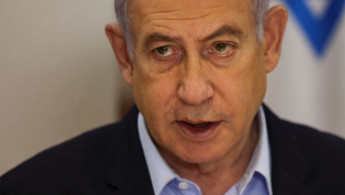Israel's 7 October failures mount as ex-Mossad agent says Netanyahu failed to sanction Hamas
Pressure is mounting on Israeli Prime Minister Benjamin Netanyahu after a former Israeli intelligence officer was accused of failing to disrupt Hamas financing before the 7 October attack on Israel.
Udi Levy, former head of economic warfare in Israel's Mossad intelligence agency, told the BBC's Panorama that Netanyahu had ignored his repeated calls to take out Hamas' financing, a policy he believed could have impacted the group's military wing.
If the policy had been implemented, "the monster that Hamas built probably [wouldn't be] like the same monster that we faced on October 7th", adding that the group would have needed "billions, not millions" of dollars to finance its armed wing.
He further alleged that a sum of financing for Gaza, which is done with Israeli approval, was being diverted to Hamas' armed wing.
Hamas denies the accusation that it diverts money set for aid and the governance of Gaza to its armed wing, with the BBC noting "it is impossible to know how much donor cash – if any – Hamas may have appropriated for military purposes".
Netanyahu has previously told party colleagues that "anyone who wants to thwart the establishment of a Palestinian state has to support bolstering Hamas and transferring money to Hamas… this is part of our strategy – to isolate the Palestinians in Gaza from the Palestinians in the West Bank".
The accusations come as greater scrutiny is placed on the Israeli government and military over its inaction and, misplaced priorities, in the run-up to the 7 October attack on southern Israel that reportedly killed around 1,200 people, according to Israeli officials.
This includes the dismissal of warnings within the Israeli military's signals intelligence agency that Hamas was actively preparing an attack on Israel as noted in the 'Jericho Wall' document, a Hamas document captured by Israel detailing the plans of an assault.
Likewise, the Israeli army's repositioning into the occupied West Bank has also been marked for criticism, with commentators laying the blame on the capture of Israel's government by the far-right settler movement in the West Bank.
According to Aluf Benn writing in the Israeli daily Haaretz, the Israeli military had 400 combat soldiers and a dozen tanks stationed on the border with Gaza, compared to 21 to 22 battalions stationed in the West Bank.
Benn argues that the defence of the Gaza border was secondary to defending illegal Israeli settlements in the occupied West Bank, whose presence has caused an uptick in violence following numerous settler attacks against Palestinian villages in the territory.
Following the revelations of multiple failures from the Israeli military, its chief Herzi Halevi ordered the beginning of a long-awaited probe into the military's failures that allowed 7 October to happen, according to The Times of Israel.
The internal probe will include investigations over the failures of commanders to notice Hamas preparations before 7 October, as well as prepare for said attack themselves.
However, the military will not be investigating the policies of the political leadership in a bid to avoid confrontation with Netanyahu and his far-right allies Bezalel Smotrich and Itamar Ben-Gvir, who have previously slammed the demands for probes by the army into the failure.
Israel's war on Gaza has killed at least 29,310 Palestinians - mostly women and children, and injured over 69,330, with aid agencies warning of famine in the enclave, and the ICJ deeming Israeli conduct in the war as plausibly constituting genocide.





 Follow the Middle East's top stories in English at The New Arab on Google News
Follow the Middle East's top stories in English at The New Arab on Google News


